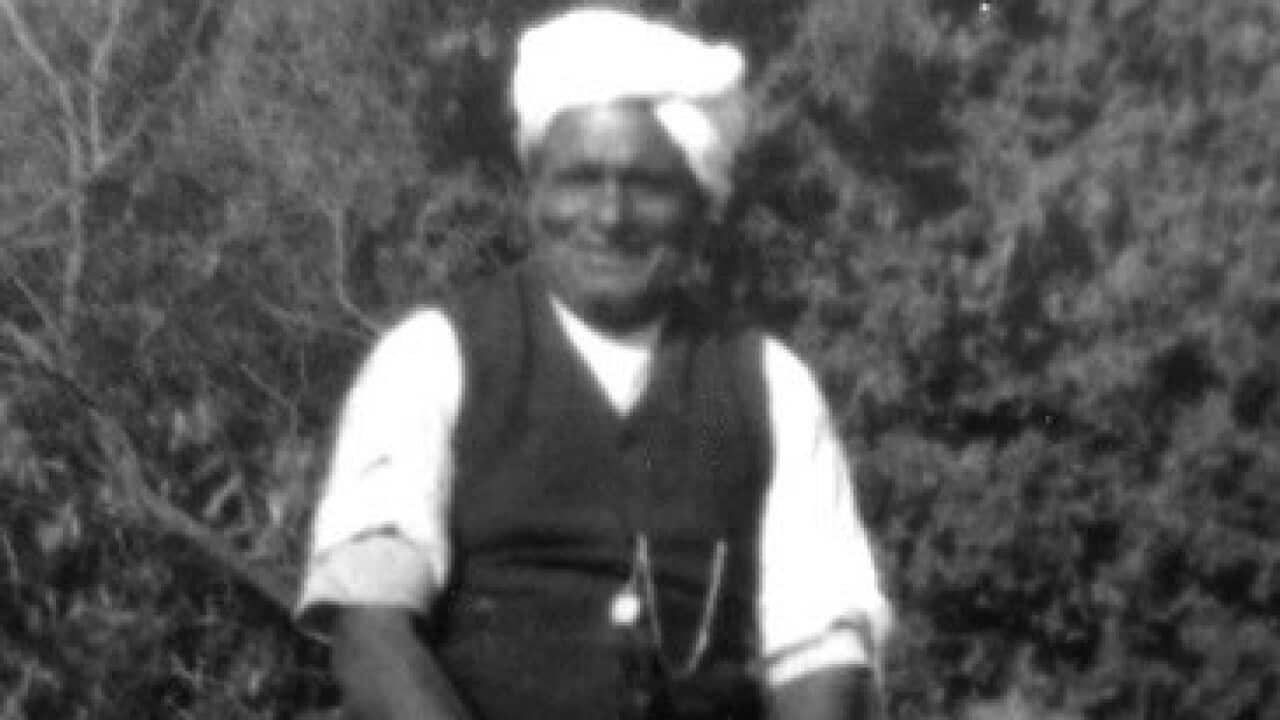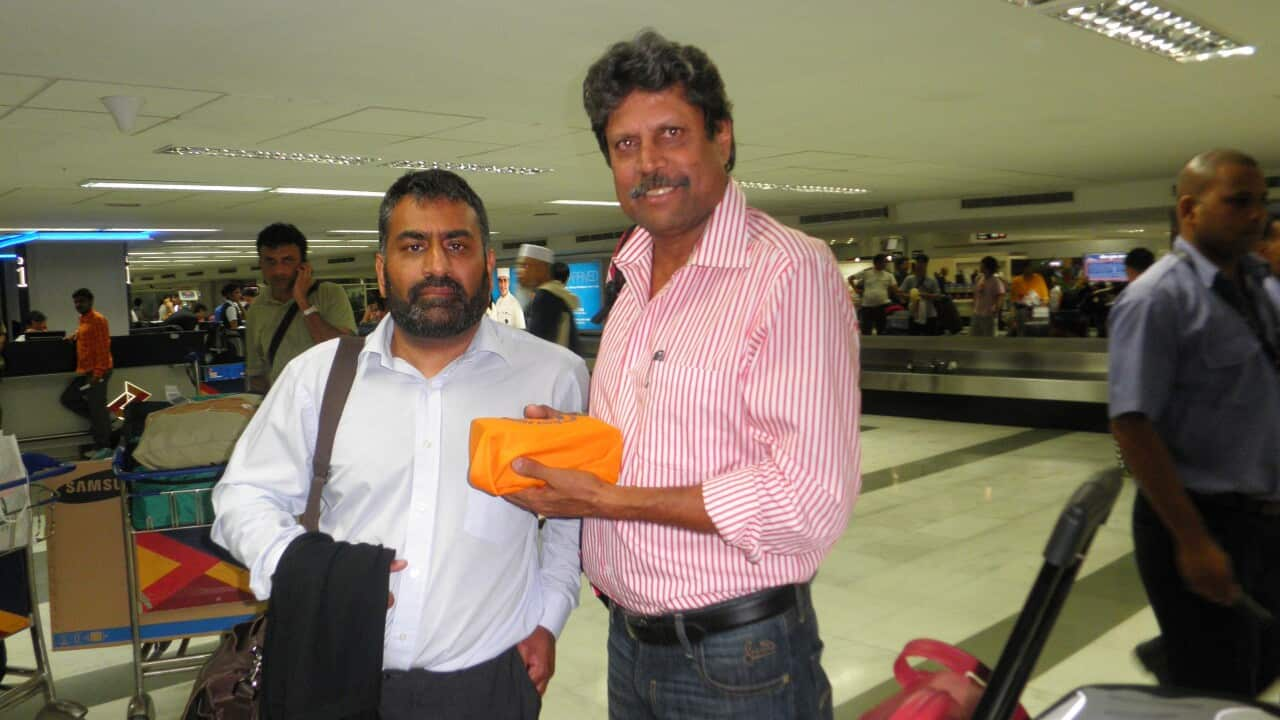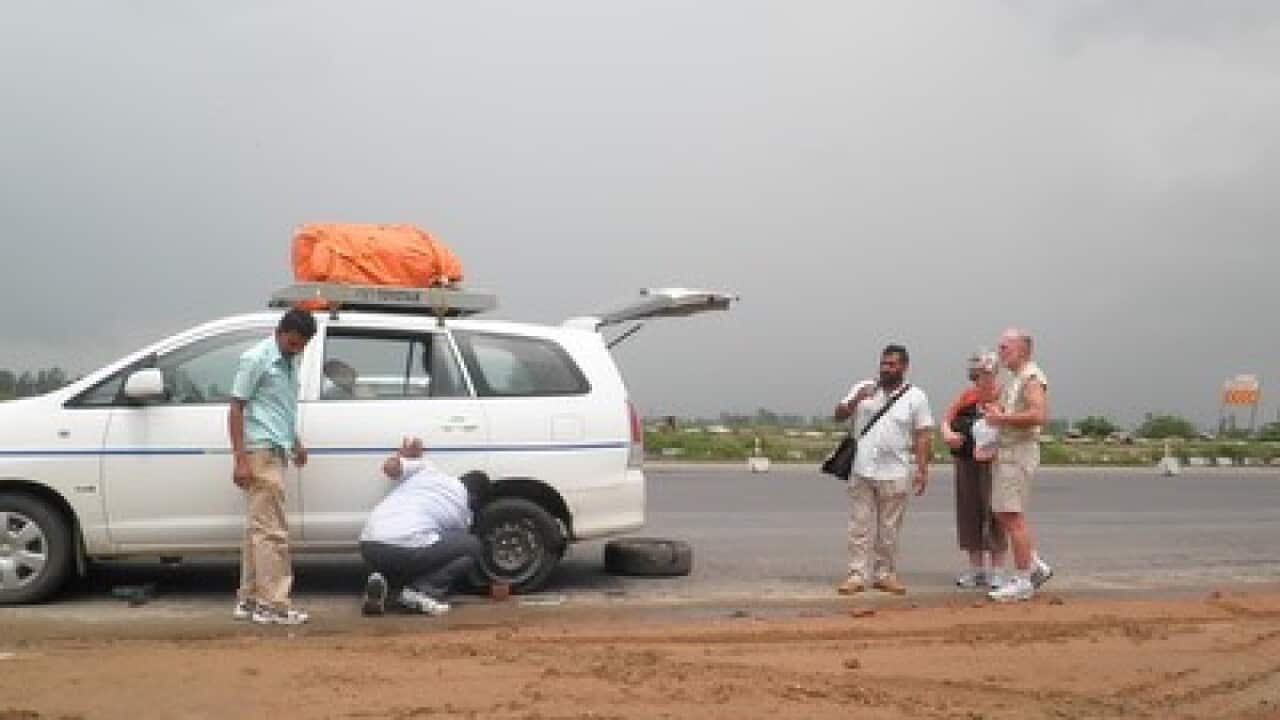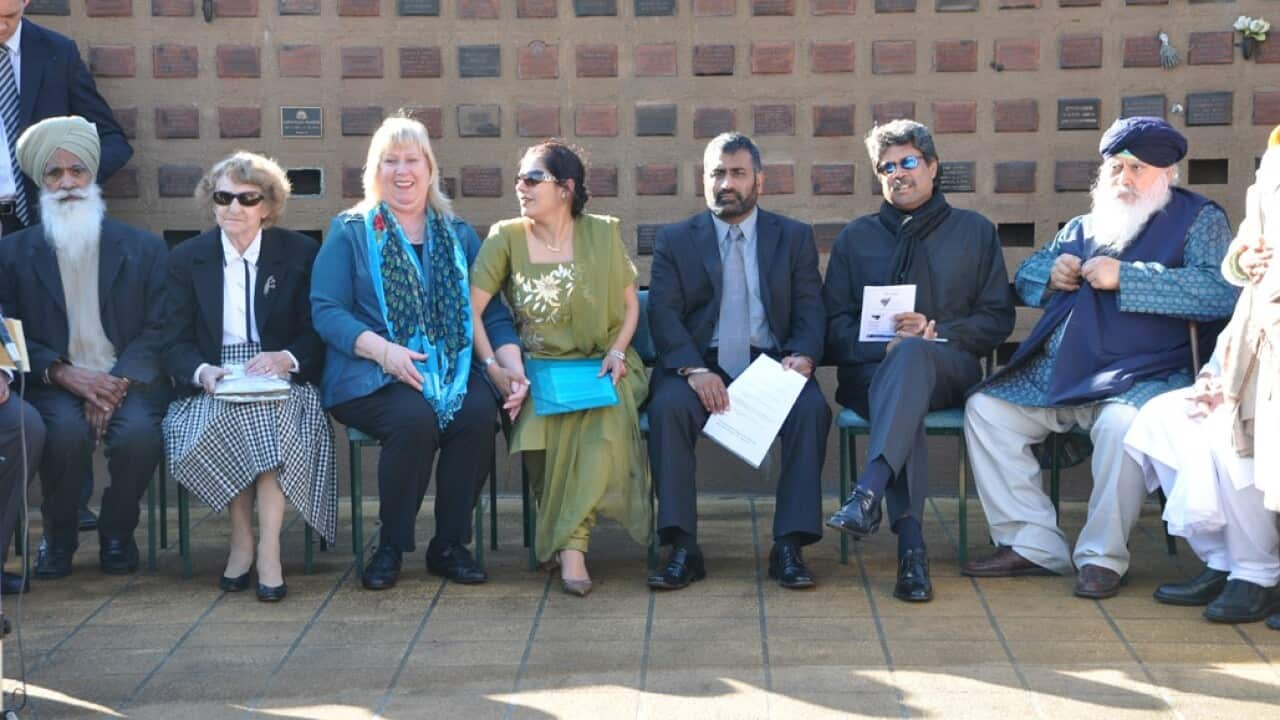To read and know more about Pooran Singh's story, which spans from the 19th to the 21st century and brought cricket legend Kapil Dev to Australia on a goodwill mission, click on the link below:
( Read transcript for the last part of Pooran Singh's final journey below. Please note, the audio for this portion of the documentary is currently unavailable.)
Music + Studio: The respect and honour bestowed upon us at the village has completely won us over. Harmel had already said to me earlier that there are many, many similarities between Warrnambool and Uppal Bhopa. Much like Brian and Alice had dropped all of their personal commitments to look after Harmel, his village folk too, like those in most other Indian villages, set everything aside in order to be hospitable to their visitors, even if the visitors are complete strangers. At this point, I thought I should check with Len and Chris about their thoughts about the village reception. The day was hot, and we were sweating profusely, but the village folk were gently fanning us with traditional Punjabi hand-held fans. In fact, they even gifted two of these to Len and Chris as souvenirs.
(Sound of the hand held fans)
Chris: Ecstatic….very, very emotional. I don’t think there is one word in English or Punjabi or any language that I can use to describe how this feels.
Len: I’m overwhelmed… You couldn’t imagine what was going to be the reaction here today… I didn’t expect anything like this. I thought we’d come in, have a bit of ceremony, a drink, witness a handover and go… It hasn’t been like that…. It’s been terrific.
Manpreet: Something you’ll remember for a lifetime?
Len: Oh, more than a lifetime, yeah.
Chris: I think I’ll remember it for more than a lifetime, I’ll hand it over to my grandchildren and great grandchildren.
Studio: Just like Crystal wants to savour these memories of India and hand them over to her forthcoming generations, so that they will know of her amazing Indian experience, it is amply evident that Pooran ji’s family has preserved their memory down many generations and was quite aware that their ancestor had an equally amazing Australian experience. Perhaps that’s why we have been so warmly felicitated here today. 90-year old Amar Singh, who was the son of Pooran’s oldest nephew, Gurcharan Singh was also present at the ancestral house. He was the one who presented us with all the gifts at the gurudwara and here at the house, he gave us a brief message.
Amar: Now I’d like to talk to you. I’m very thankful to you that you’ve made the special effort of coming here today.
Manpreet: thanks are due to you for making us feel so honoured and privileged.
Amar: No, really, thank you.
Manpreet: Had you heard about Pooran ji while growing up?
Amar: No. Just my wife and the others knew a bit.
Studio: Thereafter, in the presence of the whole family and the media contingent, the box containing the ashes was brought out and Harmel handed it to his oldest living relative, Amar Singh. They bathed the box with a mix of yoghurt and milk, much like a recently deceased body is bathed, before the last rites are performed. After this small but significant ritual, we left the village, bound for our final destination. After seeing us off, the villagers began ceremonial prayers at the temple, the ‘Akhand paath’ which involves continuous prayers for 48 hours. Music
Music

Pooran Singh's family members perform the last rites before the ashes are taken to Haridwar for immersion in the Ganga river Source: SBS Punjabi
Studio: With a multitude of emotions playing within us, we embarked upon the final leg of our journey – Haridwar, the ancient city nestled at the banks of the holy River Ganga, where the ashes would finally be immersed. We reflected upon the fact that even though our lives had intersected suddenly, united by Pooran ji’s final journey, but at another level, we were all travelling on our individual journeys too. We felt the presence of the others who were also a part of Pooran’s journey, yet not physically with us in the car right now. Alice had kept in touch with us from Australia regularly, so had Kapil Dev, who was travelling to Mumbai and Hyderabad for business commitments. Then I reflected on a question I had asked Kapil ji while we were in the aircraft, flying to India.
Music
Manpreet: I think the humanity you have shown by setting aside personal commitments and coming to Australia to collect Pooran ji’s ashes has won many people over. Tell me, what is the most significant or stand-out memory for you personally, from the whole of this story?
Kapil: I think right from the start to the end of this story, everything about it is strangely different. I think it’s my good fortune that I have been involved in something that showcases humanity and personal feelings. Maybe sometimes we do things like this in life, knowing that others around will appreciate it; or sometimes one thinks I must have done many wrong things in life, let me ensure that the ledger balances and do some things that feel right (laughs). One thing is for sure: my involvement in this story has made me feel really good. I didn’t hesitate for a moment or feel unsure about it when I gave you my commitment that I will come to collect the ashes. When you mentioned the story to me, my heart told me to say yes, this should happen. The voice didn’t come from my head, it came from the heart and I didn’t think about any results or outcomes. But now that this journey is coming to an end, I feel that this was a very worthwhile cause… I feel happiness deep within my heart. Perhaps I may not have had a similar satisfaction on scoring a century while playing cricket or taking 5 or 10 wickets in a match… That’s the kind of joy I have felt. And one feels even nicer about doing something for Indians that are settled overseas – the diaspora is always more sentimentally attached to the homeland, so I feel very good on that count too. Sometimes you do things without expectations, and the media takes its own view about it. You know, the things that have been reported in Australia lately, I don’t think that they should have been reported that way. Australians are such good friendly people… I’m sure there are some bad people too, but a majority are really good and that must be highlighted. Perhaps I think a little differently – I’m a positive person, I think positively and like to do positive things.
Manpreet: Regarding the Pooran story, have you had any feedback from people settled in other countries, apart from those in India and Australia?
Kapil: Yes, many people settled in various parts of the world have contacted me, sent me messages and emails… From Germany, England, America and even some really small countries which hardly have a visible Indian population - people have contacted me from even those small countries when they heard about this story. Now I’ve criticised the media on some counts, but I should also appreciate the media here – they’ve taken this story from a small town in Australia to every corner of the world… People have read it and responded to it very positively. It’s a wonderful feeling, and I feel it would be good if the media highlight positive stories more often. Music
Music

Front page of the daily newspaper Hindustan Times in June 2010 which led to the discovery of Pooran's family in India Source: Hindustan Times
Studio: There is no doubt that this story has reached many corners of the globe and has touched many peoples’ hearts. But what was even more remarkable for us was the fact that despite our completely diverse backgrounds, we were bound together by an inexplicable relationship, and today, for the first time in our lives, had come to Haridwar together, to immerse Pooran ji’s ashes.
Manpreet (in car): Harmel ji, the 30th of July has dawned, we are now in Haridwar, on our way to Har ki Pauri for the final ceremony. Have you ever participated in a ceremony like this before?
Harmel: Not really, I haven’t. I’ve been to possibly a similar ceremony at Keeratpur, but I don’ know how similar or dissimilar it is.
Manpreet: Pooran Singh’s final journey has been a very public journey – everybody seems to have been a part of it because it was covered so widely in the newspapers and television. But then it has been a very personal journey for all of us as well; what about you personally, what has this meant to you?
Harmel: This has connected me to my great uncle in such a special way, that it seems so amazing that you can love, feel a person, not even with us in soul, but in spirit. And it seems that he’s been with us every step of the way – he’s experienced every single experience we’ve experienced. When the whole journey started and it was very early speculation, I never ever imagined that it would get to the level it has got to now – that I would get these emotions and feelings. You know it’s something that happened so many years ago, but real life experience is very, very different.
Studio: Neither Len, nor Chris, nor Harmel, nor I, none of us had ever been to Haridwar before. (atmos) I had a stereotypical image of Haridwar in mind, of a morose and morbid city, completely burdened with death and mourning. But the Haridwar that greeted us was nothing like that… In fact quite the opposite… Especially because spirited and brightly dressed Kanwariyas had taken the city over in the past few days. We didn’t even know about these Kanwariyas, who are devotees of Shiva, and who travel thousands of kilometres to Haridwar to collect the holy water from the River Ganga. Once they fill their ‘kanwar’ or small urn with the holy water, they walk back to their villages for days and even months together. We saw hundreds of thousands of these Kanwariyas, clad in bright orange and red robes – creating an atmosphere of happiness, gaiety and celebration of life.
Atmos

The colourful Haridwar, on the banks of the holy river Ganga, where last rites are usually performed Source: SBS Punjabi
Studio: Although we were all a mixed bag of emotions until now, but seeing these Kawariyas, we became enthusiastic too and felt that since we’ve reached our final destination, it’s time to cast away all the sadness – a time for great celebration.
Atmos
Studio: At Har Ki Pauri, a Pandit ji (priest) was awaiting us, belonging to a family of priests who have presided over countless ceremonies at Haridwar for generations. Today’s ceremony was a mystery for both Harmel and I. Harmel had already told me that his family is Sikh by religion and believes staunchly in the Guru Granth Sahib. He had never repeated any Hindu mantras before, didn’t know any Sanskrit and in fact, couldn’t even speak Hindi. But since his great uncle expressed a desire to be immersed in the Ganges (where rites are performed in the Hindu tradition), he would leave no stone unturned to fulfil that wish. With that in mind, Harmel took his first-ever dip in the Ganges, and sat on a platform at the banks of the holy river, where the Pandit began the prayers
Priest – reciting prayers…
Voiceover: After this, Harmel did exactly what the priest asked him to do, with me as the interpreter. I saw many emotions on Harmel’s face – seriousness, responsibility, elation and satisfaction. And then the moment arrived when the box containing the ashes was to be opened and all of us held our breaths. We had carried a screwdriver with us, aware that the box would need to be prised open. On applying the slightest pressure, the box opened and a torrent of milky white ashes poured out impatiently… They looked fresh, as if they had just been gathered yesterday.
(sfx) Priest – “open this”… (click)
Studio: The ashes were piled on a white piece of cloth in front of Harmel. Some rituals were carried out by mixing the ashes with grains, sesame, rose petals, sandalwood and other elements; then the final prayers were offered, with Harmel repeating after the Pandit…
Priest & Harmel : Om, at Haridwar, Har Ki Pauri, at Brahmkund, I, of surname Uppal, and named Harmel, from my hands, will offer in the name of my respected grandfather, Pooran Singh, food for Brahmins, donation of clothes, donation of food.… Dear Mother Ganga, please be witness to this virtuous deed, please grant peace to the soul of our respected grandfather, grant him a place in heaven, grant him salvation. Let there be peace and love within our family, and if we’ve erred, please forgive us… Studio: And then, the final moment arrived for which five of us had left Australia, five days ago; we had arrived at Haridwar after driving through five Indian states and now, five of us, meaning Harmel, Len, Crystal, Pandit ji and I were participating in the final ceremony - ash immersion.
Studio: And then, the final moment arrived for which five of us had left Australia, five days ago; we had arrived at Haridwar after driving through five Indian states and now, five of us, meaning Harmel, Len, Crystal, Pandit ji and I were participating in the final ceremony - ash immersion.

Harmel with Pooran's ashes at the banks of the Ganges, just before immersing them Source: SBS Punjabi
Priest: Fold your hands, pay respect to your grandfather, and let go of the ashes here… Pick up this cloth from all its corners, touch it to your forehead, take it near the water, pour all of the ashes in and then let go of the cloth…
Manpreet: So this is it? Is this the final immersion?
Priest: Yes.
Harmel: I don’t want any cameras or photographs now….
Studio: As per Harmel’s desire, we didn’t film or take any photographs of the ultimate moment when the ashes were finally immersed. But the memory of that moment will forever be etched in our minds. It seemed that those milky white ashes, which had been painstakingly preserved for 63 years, were so eager to be one with the river Ganga that they dissolved in less than an instant. I couldn’t control my tears anymore and let them flow freely, but Harmel was completely stoic: his eyes were absolutely dry and his face glowed with a single emotion now – complete peace.
Manpreet (interview at the banks of the river): Harmel, you just said to me “Pooran’s happy now”. Is that how you feel?
Harmel: Yes yes, his last wish has been fulfilled now. It’s a real experience. I think we feel a lot of contentment, feel a lot of shanti (peace) in all our minds. Although it was very emotional but ultimately Baba Pooran Singh’s wishes have been fulfilled. I have to thank the Guyett family, and SBS Radio, not forgetting Kapil Dev, Len, Crystal and every single person who has helped us along the way. I can’t stop thanking you, really, and I’m sure Baba Pooran Singh now is looking down on us and he’s smiling at us now….

The box containing Pooran's ashes is opened, so that Harmel can immerse them in the Ganga, according to his grand Uncle's wish Source: SBS Punjabi
Voiceover: I’m convinced that there was something really special about Pooran Singh ji, because of which so many people shared his final journey with him. But I’m also convinced that there was divine intervention in making all of this happen since the rain always seemed to stop at the right time, everything seemed to happen like clockwork, unknown strangers offered help at critical times, and amazingly, the day after we reached Delhi from Haridwar, meaning the 1st of August, the Delhi-Haridwar highway was shut down because of the march of the Kanwariyas… Had we left Australia even a day later than we did, we may never have made it to Haridwar! All in all, it is remarkable that after a long wait of 63 years, Pooran ji completed his final journey in just five days…
Harmel: ...The similarities along this journey were not just coincidental; it was written by God. There’s been so many comparisons of experiences for all of us and how were able to share them during the journey - it was just amazing.
Manpreet: I will ask you one last thing – I had some fears that you might not actually put the ashes in... seeing you holding on to that box for all these days. Was it hard?
Harmel: That was very, very hard because, it literally seemed from the time we left Warrnambool I had got so attached and found that Pooran was with us. It seemed like leaving something. But now his spirit has been released and he is happy now, as we all are.
Manpreet: And the amazing thing is that Alice called at just the right time and reminded us that today is Avis Quarrell’s birthday too.
Harmel: Oh yes, again, not a coincidence, it was the fate of God.
(Bells, atmos…)
Crystal: Going through the rituals with Harmel and watching everything that was happening was once in a lifetime experience. I never in my whole life thought I would ever see anything like this and I felt so much for Harmel…
Voiceover: Crystal went on to say that she had learnt a very valuable lesson today – that once a person dies, all he leaves behind is a handful of ashes… nothing else. It reminded me of a tale about Alexander the Great, which is popular in the spiritual circles of India. It is said that a dying Alexander had left instructions that, when his hearse was carried through his kingdom after his death, his hand should to be left out uncovered, with his fist open – so people would know for sure that even if someone conquers the whole world, upon their death, they leave empty-handed. Perhaps this is exactly what we all learnt today, after immersing Pooran ji’s ashes in the Ganges….
Len: I can’t explain for somebody who is not very religious but to see all these people here at the same time… It’s almost like all these boys in orange have come down as a pre-ordained mission from God.
Crystal: Personally, it’s been a self-searching journey as well. It makes you look inside yourself and think well, what is important in life? You can’t lug everything with you and when you come to a place like this you could take even less. And when those ashes go into the river, you can’t take another single thing with you… Your family and all the other things are left behind and they move on and move forward and do their journey. It just shows you what is important in life… It’s being in there and doing things, living a really full life and having no regrets.
Studio: It’s so true, that after one dies, one only leaves behind a mound of ashes. Why not live earnestly and honestly so that after death, one at least leaves behind fragrant memories? Perhaps that’s the single biggest thing we can learn from Pooran Singh ji – because a simple Punjabi migrant like him has today become a symbol of humanity and goodwill across many countries, and has illustrated mutual respect which has underpinned Australia-India relations for many generations. I was reminded of a comment Kapil Dev made at our Melbourne studios, which I will now share with you.
Music
Kapil: Pooran Singh ji was a bachelor, didn’t have any offspring, but he certainly left his mark behind. Going to Warrnambool, I was struck by the number of people knew him – although he was a simple hawker, but people talk about him even a hundred years after he arrived there and that’s remarkable. So this is not a sad occasion, it is a happy occasion that someone’s last wish has finally come true. I was celebrating in fact, I wasn’t feeling low, but I was emotionally touched by the story in totality. It was also great to see so many media outlets there, covering this story… Obviously, there was something quite special, something extraordinary about that man, that he left such a great story behind…
Studio: And so, even I felt that this is a moment of true celebration, not of sadness. So wiping my own tears, even I felt like thanking our wonderful community elder Pooran ji, for this priceless journey and once-in-a-lifetime experience, in the same words that Kapil ji had articulated in Warrnambool a few days ago.
Kapil: I’ve cried during this story many times, but today we all have to smile. We have to go with a happy mood… Thank you, Pooran Singh ji, you’ve made us proud!
(Applause + music to end)
Please note: "Ganga" - the native Indian name for the River Ganges.
Listen to the audio documentary Pooran Singh's final journey

'It's time for Pooran to go home'





